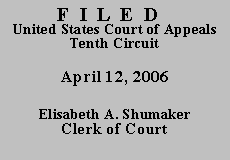

| CHUKWUMA E. AZUBUKO and
PRECIOUS OKEREKE, Plaintiffs - Appellants, |
No. 05-6179
(D.C. No. CIV-05-176-C) |
Although Plaintiffs' brief and pleadings are unclear, their action is apparently related to a New Hampshire traffic citation issued to and paid by Plaintiff Okereke. Plaintiffs' complaint names the State of New Hampshire as a defendant, claims a violation of Plaintiffs' equal protection and due process rights, and seeks both $2.5 million in damages and an injunction requiring the state to withdraw the traffic citation.
The district court dismissed the complaint as frivolous under 28 U.S.C. § 1915(e)(2)(B)(i), concluding that this suit is barred by the Eleventh Amendment to the Constitution. Although we normally review a dismissal for frivolousness under an abuse of discretion standard, because the district court's decision rested on an issue of law, our review is de novo. See Conkle v. Potter, 352 F.3d 1333, 1335 n.4 (10th Cir. 2003).
The Eleventh Amendment provides that "the Judicial power of the United States shall not be construed to extend to any suit in law or equity, commenced or prosecuted against one of the United States by Citizens of another State." U.S. Const. amend. XI. This Amendment "immunizes states from suits in law or equity, including injunctive actions." Elam Constr., Inc. v. Reg'l Transp. Dist. 129 F.3d 1343, 1345 (10th Cir. 1997) (per curiam); see also Franceschi v. Schwartz, 57 F.3d 828, 831 (9th Cir. 1995) (per curiam) ("The Eleventh Amendment bars suits which seek either damages or injunctive relief against a state, an 'arm of the state,' its instrumentalities, or its agencies."). Plaintiffs' action, which seeks damages and injunctive relief against the State of New Hampshire, is therefore barred by the Eleventh Amendment. The district court properly dismissed the action.
For the foregoing reasons, we DISMISS this appeal and DENY Plaintiffs' motion to proceed in forma pauperis on appeal.
ENTERED FOR THE COURT
David M. Ebel
Circuit Judge
*.After examining appellant's brief and the appellate record, this panel has determined unanimously that oral argument would not materially assist the determination of this appeal. See Fed. R. App. P. 34(a)(2) and 10th Cir. R. 34.1(G). The case is therefore ordered submitted without oral argument. This Order and Judgment is not binding precedent, except under the doctrines of law of the case, res judicata, and collateral estoppel. The court generally disfavors the citation of orders and judgments; nevertheless, an order and judgment may be cited under the terms and conditions of 10th Cir. R. 36.3.